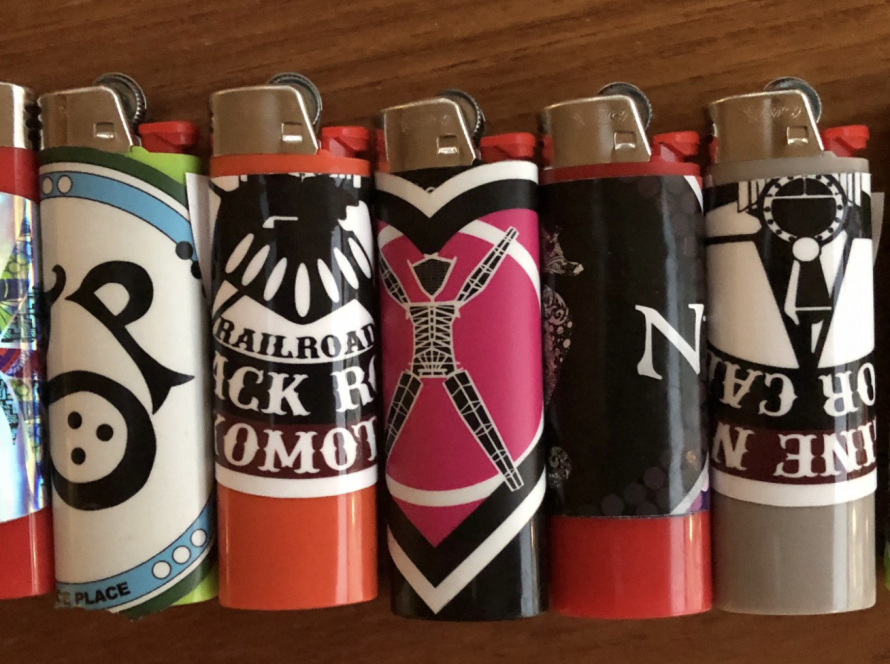College job #1
Last night, a wee bit high and journaling, I started thinking about jobs I held in college and my coming-of-age years. I started listing them best I could remember. I was surprised by how many jobs I’d had. There were also gaps in my chronology and spots where I wrote “probably some crap job paying very little.” Maybe I’ll remember more as I write my stories. Maybe not. For now, I’ll start with my first job in college.
slinging slop at the dining hall
To frame this whole conversation, first, there was no question about it: I would be working during my college years.
University of Maryland, College Park, the ‘whatever … it’ll do’ state university I attended starting in the fall of ’81 (which developed a pretty good reputation in the years after I left) is where I landed when my fantastical and wild visions of attending an out-of-state school fell flat.
Academic scholarships were awarded meagerly in the early ’80s, and I don’t even know if I would have qualified for one had they been more plentiful, but I certainly qualified for the university’s work-study program, which essentially was a way of ensuring an endless stream of minimum-wage workers to support the many grunt functions of campus operations.
For me, that meant a job at the dining hall in our quad of four high-rise dorms, which was incredibly convenient as I had no car. (Freshman living on campus weren’t allowed to have cars, and I couldn’t have afforded one anyway.) Basically my commute was 1) take the elevator to the ground floor, 2) walk about two minutes (if even) and 3) arrive at work. Super convenient. I was paid minimum wage–$3.35/hour.
Our shift would arrive and assemble, then the student manager would assign roles to each person. In the beginning, I accepted these assignments as they were given out, though I quickly came to favor the role of server over all the other dining-hall jobs, and I did what I could to secure that position by arriving early, being super-friendly with the student managers and full-time managers, and, well, being a stellar server.
I liked the server role for many reasons: It was social and engaging, I was in a near-constant state of wanting attention (especially male attention) and was certainly ‘more scene’ and visible as a server than as a dishwasher, I was in my ‘hood–my local quad–and was getting to know more people with each passing week; and, frankly, it was a much cleaner job than cleaning tables, clearing plates of food, or tackling the seemingly endless stream of dirty dishes. I still came home smelling of dining hall odors, but that was a given no matter which shift I did for four hours.
I had quite a bit of fun being a server–engaging with people, hooking people up with a little bit of extra food if they wanted it, and keeping the spirits of the serving line up, best I could.
But while I often got assigned the server position, I didn’t always get it; and I did have my fair share of BOH dish-doing. (My recollection is students didn’t prepare food; only the full-time staff did.)
The amount of wasted food was staggering. Not that I was a member of the Clean Plate Club at every meal, but I possessed an overall sense that food was, essentially, a resource, and, therefore, not one to be squandered or treated as trash, as it seemed many did.
I recall one particularly profligate person with whom I often ate my dining-hall meals. She would fill her plate with more food than she could possibly eat and sometimes go back and pile even more food on her plate, and then would smoke a few cigarettes after dinner. (Yes, the student dining halls had a smoking section back then, as all restaurants did; and, yes, I was in that smoking section along with her and all the other smokers.)
As she’d finish each cigarette–and with easily a meal’s worth of uneaten food still on her plate–she’d triumphantly extinguish her cigarette in the pile of uneaten food. It felt as if she were announcing her abundance. riches and devil-may-care attitude by being so flagrantly wasteful of food. At every single meal she did this. Every single one.
Not a work-study student herself, maybe she never thought about who had to deal with her mess. Or maybe that’s what she liked about it. In any case, someone had to roll those carts filled with dining trays of uneaten food back to the kitchen, clear the plates and prep the dishes to be washed. Sometimes that person was me.
I also remember mixers almost as tall as a person. I remember seemingly endless #10 cans of food–full and waiting to be dumped–I mean, mixed–into some dish and institutional recipe, or empty and waiting to be trashed. (I doubt anyone was recycling in 1981.) But mostly what I remember is the bifurcated labor force.
There were essentially two groups of workers at the dining hall: 1) the university work-study students, who’d been given first dibs on these minimum-wage jobs as a means of providing them some income while in school, a wee number of whom leveled up to be part-time managers; and 2) there were a lot of older Black folk. These older Black folk were not like the older Black folk I’d known growing up in Columbia–an intentional community (best it could be) founded in the late ’60s with an open and welcoming door for interracial couples and their children, for minorities of all types and for people wanting to live integrated and together rather than in same-same communities.
These claims of integration may not seem like much now and may even seem anachronistic, but given the Civil Rights Act of 1964 was passed in–you got it!–1964, and Columbia, Maryland was founded in 1967, this welcoming of others and intentional integration was a thing back then. I had known, for the most part, Black adults who were teachers or parents of my friends or business owners. I didn’t know these kind of older Black folk with whom I worked at the dining hall.
They were clearly poorer, clearly presented fewer opportunities in life and clearly unlikely to change careers and find themselves in some professional job in the years ahead. They were lifers–people who’d probably been working at this dining hall, or in some other low-skill, stand-on-your-feet-all-day, low-wage jobs. They were almost all in their 40s, 50s and 60s, which would have had them being born in the 1920s, ’30s and ’40s. It seemed as if there had been some big hiring window, and then that had closed because none of them were young. But that’s just a guess.
They looked and felt different. Their countenances were different. Their body language and vibe were different. They felt foreign to me. Like “others.”
My family hadn’t been particularly well off, and in a story for another day, as I headed off to college, my parents were in a profound financial crisis that had my mother working two full-time jobs while my dad attempted to dig out of the financial quicksand pit some decisions he’d made had put the family in. I didn’t expect financial support from my parents, and I didn’t get it, but we had lived in a single-family home, in nice suburbs; and while a lot of my peers’ families were probably better off than we were, I’d still experienced a middle-class childhood, even if I hadn’t really understood what that meant.
But when I saw this cadre of older Black folk working–not just for a shift, as I was–but full time. Not just on Monday, Wednesday and Friday, as I did, but ever day. Not just for a semester or a part-time job while they got an education and improved their skills as I was doing, but probably for a lifetime, I saw the world, and I saw myself differently. I understood the milieu of my childhood had given me a profound advantage in the world. Some of Black kids I knew had parents who were doctors or they were the valedictorians and top academics in my class; some were average and everyday, as were the white, the Indian, the Asian or whatever other kids in my class, but we were all middle-class kids who’d grown up in an environment of opportunity. It was clear the dining hall “lifers” hadn’t, and I doubted a big break was coming for any of them any time soon.
Working with them but not with them (we had litter interaction despite working in the same small area), I was reminded of an experience I’d had a couple years prior when I’d been on an overnight field trip to the eastern shore for a biology class, and I’d gone for a walk along the beach–not a boardwalk-y beach, but some more rural, less populated and more agrarian part of the beach.
I came across a shack in near distance in which maybe six or seven older Black women were standing and working. They were shelling crabs. They were on their feet. They were in an shack. With no A/C, no heat, no nothing. In the heat and in the cold. With the smell of crab meat and crab shells and decay all around. I’d shelled a crab or two in my life and knew how the shells can cut one’s skin. I watched these women from a distance, overcome by the limited options in their world, grateful for all I’d been given.
Yes, people can escape poor upbringings and move out, hopefully to make a better life, and people do. But not everyone does or can–or wants to. Maybe they want to be near family. Maybe Life happened and they got older and never left when they were younger and were more full of hope. I don’t know. I just know I watched these women, shelling these crabs, and I wondered how many hours a day, over how many months and years of their lives they would do this work. I knew they were paid a pittance. Piecemeal, most likely. Probably by the pound. Had they been men and been slinging tools and lifting heavy things, they’d have been paid a lot more, but this was the late ’70s, and these were poor older Black women living in a rural eastern shore community.
The older Black folk working in the dining hall kitchen felt similar to me. My assumption is they were paid full-time salaries from the university and had reasonable benefits, as was more common in the early ’80s, but that’s an assumption. What I knew, fairly confidently, was they likely weren’t escaping this drudgery and moving on and up any time soon, and the juxtaposition of the work-study, going-to-college-to-improve-their-lives workforce next to the “lifers” gave me pause and made me grateful.
We didn’t interact much with the older Black folk. They focused more on the food prep and BOH kitchen work, and students did more of the table clearing, plate cleaning and dishwashing, but there was this one older Black man who worked on “our side” and cleaned many of the mega-ultra-large mixers and bowls. He was old. Or maybe he was just really worn and old-looking. He joked with us. Laughed. Was jovial But was also very worn-looking and heavy with exhaustion.
I think it’s good to have crap jobs–jobs that show you where you don’t want to land. I think such crap jobs are particularly valuable when one is young and in school or apprenticing, as they provide a concrete example of what you probably don’t want in life.
I knew–from the moment I started my work-study job in the dining hall–it was a temporary job. I knew I was working at the dining hall because I was attending university at that school, so I could learn and advance myself and my future job and career opportunities. I had choice. I had options. I had a future beyond the dining hall of UMCP. For the full-time older workers there, not so much.
There are many things one can learn at a job and at a school, and they don’t all happen in the classroom. I learned a lot in my first on-campus dining hall job. The kind of learning an education can’t buy.




